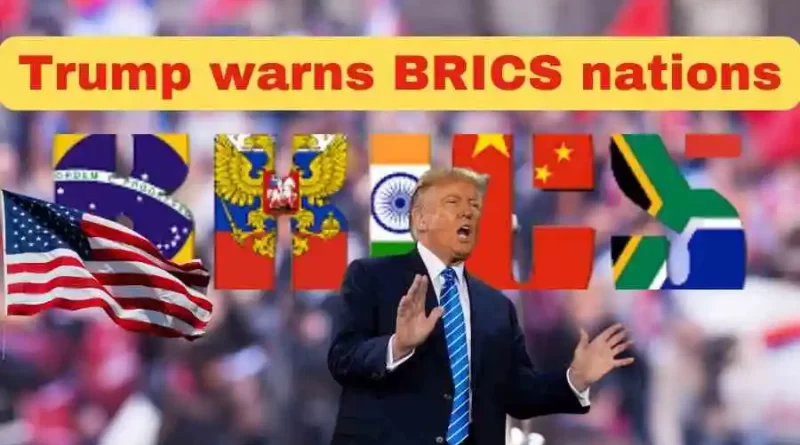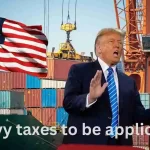Trump warns BRICS against any move to ‘destabilize’ the dollar
Trump’s ultimatum to BRICS: abandon de-dollarization or face 100% tariffs
“The idea that the BRICS countries are trying to move away from the dollar while we stand by and watch is over. We require a commitment from these countries that they will neither create a new BRICS currency nor back any other currency to replace the mighty U.S. dollar, or they will face 100% tariffs and should expect to say goodbye to selling into the wonderful U.S. economy,” President-elect Trump wrote on Truth Social recently.
Trumps direct threat to BRICS nations
Threatening the BRICS nations on the possible devaluation of the US dollar, Trump asked for commitment from the block of nine nations in the group to comply, or else they stood losing a lot with the new dispensation at the Capitol Hill in January. Meanwhile, Turkey, Azerbaijan, and Malaysia are in line to join the emerging economic conglomerate backed by Russia and China.
There are, however, two opinions developing from both the IMF and various agencies. The former is of the opinion that the dollar’s impact has weakened somewhat with an increasing graph of GDP in the BRICS nations, happening mainly due to the group’s policy revolving around de-dollarization. The term came into prominence when the alliance showed its intent to trade in currencies other than the US dollar. According to the statement by the organization, the total world monetary reserves hover around 58%, with a major portion of the oil purchases and selling subsequently done in the US Dollar.
Study confirms the continuation of dollar in near future
Another study presents a rather positive scenario regarding the US dollar in the absence of any threat to it in the near future. Further, domination of the dollar over other currencies has been assessed by an Atlantic Council model by informing that the former is “secure in the near and medium term.”
In 2011, BRICS was constituted with the help of Brazil, Russia, India, China, and South Africa. And in 2023, Brazil Premier Luiz Inácio Lula da Silva put forward a suggestion to create a common currency in South America to be less dependent on the US dollar. BRICS currency, if it materializes in the near future, could offer a chance to avoid sanctions by America on Russia, China and Iran with a market largely dominated by the US dollar system.
On the face of it, that might look like a good alternative to the dollar, but ground realities beg to differ. With the group increasing in numbers by the joining up of Iran, Saudi Arabia, the United Arab Emirates, Ethiopia and Egypt and thirty-four more on their way to join the bloc, the economic and geopolitical differences are bound to happen. Thus, the chances of a new currency seem to be few and far between.
Russia sees the opportunity from the new trading alliance
Hower, Moscow already has begun seeing an opportunity of trading with other nations if the proposed currency takes shape, which helps it to tide over the western sanctions. It could also pave the way for a new payment system, according to Russia, with the introduction of a different network other than SWIFT, the global bank messaging network.
A positive development for Russia this year was the rotating chairmanship post of the economic bloc being earmarked for the country. This is seen as a good sign for the nation in the backdrop of being spurned both economically and diplomatically by the western nation in the aftermath of the Ukraine war.
A message was sent to the western nations about their deemed isolation and support by the “global majority” on the issue of challenging the American global leadership during the BRICS summit meeting in October between Russian President Vladimir Putin and Chinese leader Xi Jinping. For China as well, BRICS with its ever-increasing number of countries is a godsend, as it looks forward to fostering stronger economic ties with them and thus contesting the leading position of the US.
The move to impose a 100% tariff on the goods coming from the BRICS nations has been preceded by a 25% hike in the taxes on the products coming from China, Canada and Mexico. The previous statement about levying the hike on the goods from these countries was announced by Trump to stop the illegal immigration and drugs coming from these nations.
With the Chinese response yet to come on the previous statement from the US President-elect, the other two nations had their own share of concerns about that. The threatened tariffs on Canada seem to stand as they were earlier, with Canadian Prime Minister Justin Trudeau returning empty-handed, while Mexican President Claudia Sheinbaum was still hopeful of a possible solution. Trudeau, however, said the Friday dinner with Trump “was an excellent conversation,” and the president-elect called it a “very productive meeting.”








